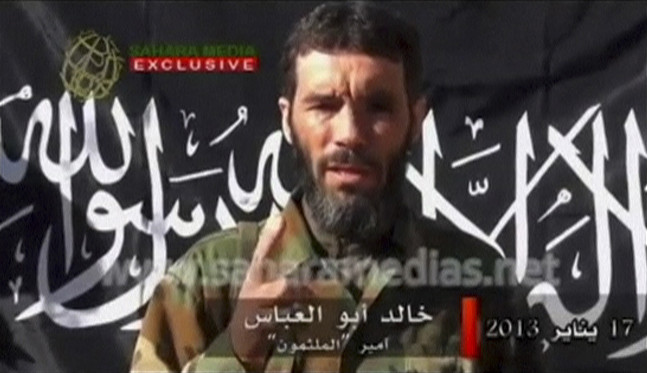Libya: US believes air strike on al-Qaeda leader Mokhtar Belmokhtar successful

The US military has said it believes an air strike in Libya targeting al-Qaeda linked militant Mokhtar Belmokhtar was a success but is still waiting for confirmation.
Pentagon spokesman Colonel Steve Warren said it was thought the strikes had hit their target but definitive proof had not yet been given. "I can confirm that the target of last night's counterterrorism strike in Libya was Mokhtar Belmokhtar," he said.
A US official told AP two F-15 fighter jets launched multiple 500-pound bombs in the attack. Authorities say no US personnel were on the ground for the assault.
The internationally recognised Libyan government in Tobruk has said it believes Belmokhtar was killed in the attacks, which it says were made with its consent.
In a statement, the government led by Prime Minister Abdullah Thinni said: "This air strike was launched by the US airforce and led to the killing of Mokhtar Belmokhtar. These air strikes were discussed with the US airforce and were carried out by the international community to help Libya in its struggle against terrorism."
An official for the Libyan House of Representatives in Beida told IBTimes UK on condition of anonymity because he was not authorised to brief the press that the air strikes took place on a farm south of the eastern town of Ajdabiya. Five are believed to have been killed in the attack. The town is home to a number of Islamist fighters including militants from Islamic State (Isis) and others linked to al-Qaeda.
The charges filed against Belmokhtar by federal law enforcement officials in Manhattan included conspiring to support al-Qaeda and use of a weapon of mass destruction. Additional charges of conspiring to take hostages and discharging a firearm in furtherance of a crime of violence carry the death penalty.
If Belmokhtar has been killed the significance will be great because he controlled networks smuggling weapons and people throughout the region
The air strikes by the US are the first time the country has bombed Libya since Nato enforced a no-fly zone in 2011 during the revolution against Muammar Gaddafi.
However, since 2011 the US has on two other occasions extracted Islamist figures accused of carrying out and planning attacks on American citizens.
US special forces went into Tripoli in 2013 and seized Abu Anas al-Libi, whisking him out of the country on suspicion of involvement in the 1998 bombings of two American embassies in Africa.
In June 2014 Delta Force carried out a similar mission to remove Islamist leader Ahmed Abu Khattala who was accused of playing an organising role in the 2012 attack in the US consulate in Benghazi which killed US ambassador Chris Stevens.
Analyst and non-resident fellow at the Atlantic Council Centre for the Middle East, Mohammed Eljahr, told IBTimes UK that "If Belmokhtar has been killed the significance will be great because he has been considered a jihadist who controlled networks smuggling weapons and people throughout the region. I believe it will be significant in that sense."
Eljahr said Belmokhtar would have been hosted by the a-Qaeda linked Abu Saleem or Ansar Al-Sharia militias in Derna but most probably moved to Ajdabiya because of a power struggle in the area.
He explained that the Islamist body in control of Ajdabiya was a mix of several different extremist groups. "It is a mix of everything. It was formed three months ago and they have links with Islamic State and Amsar Sharia. There are a lot of intertwined interests between these groups and Ajdabiya is seen as a centre for smuggling and people smuggling."
Belmokhtar, known as Mr Malboro because of his involvement in cigarette smuggling, used black market trading to fund his extremist goals. He is charged with leading the attack on a gas plant in Algeria in 2013 that killed at least 35 hostages, including three Americans.
© Copyright IBTimes 2025. All rights reserved.






















